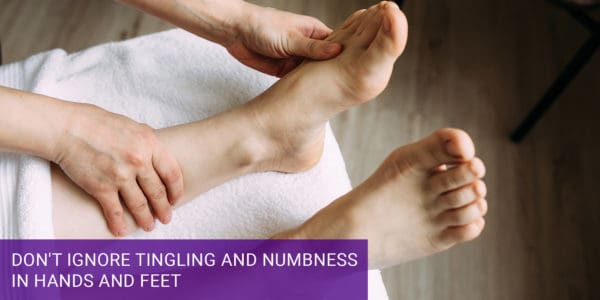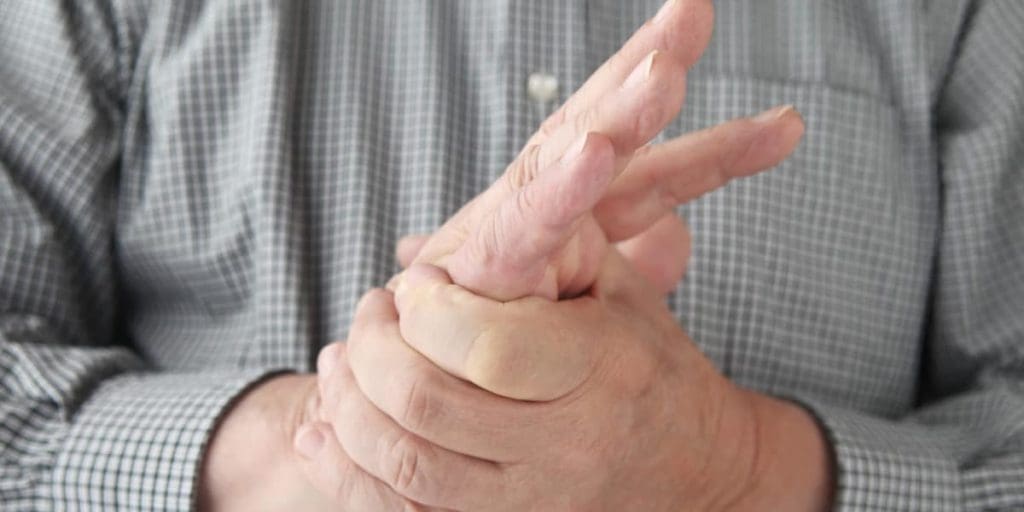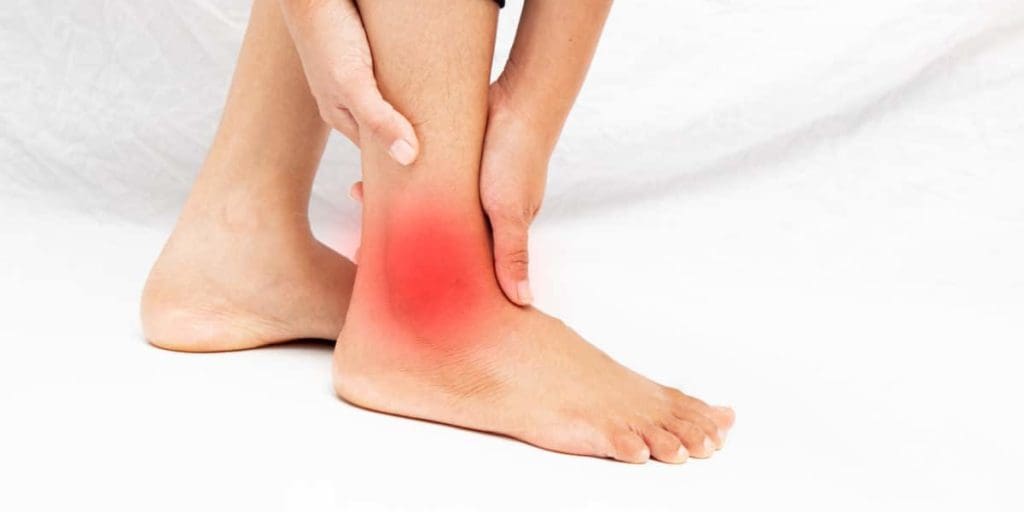
Tingling and Numbness in Your Hands and Feet Overview
If you’ve ever experienced tingling, numbness, and pain in hands and feet (or wrists and elbows), you know it feels a lot worse than it sounds. There are many reasons why you could be having these sensations, so it’s extremely important to identify the potential causes. This is especially true if you have chronic pain because tingling is a symptom for many chronic conditions.
Many people often ask, ‘When should I worry about tingling in my hands?’ The answer depends on accompanying symptoms and their severity.
A personal testimony of pain, tingling and numbness video
Speaking from personal experience, I made the mistake of ignoring unexplainable left foot tingling and numbness. It’s not uncommon for people to experience feet and hands tingling, especially after sitting in one position for too long.
But progressively, it got worse and eventually, the pain, numbness, and tingling moved up my foot and into my left leg. I’ll never know if catching it sooner would’ve prevented my herniated L5. My advice for anyone in a similar situation is to go to the doctor sooner rather than later.
Not all tingling indicates a serious health problem. Sometimes, you may feel nerve pain or experience a lack of nerve function that feels like pins and needles, but persistent tingling in fingers and toes warrants attention. However, once you start moving your limb, the tingling may subside. If this happens, it’s likely due to restricted blood flow. Although it feels awkward and uncomfortable, it’s only temporary.
You may have also had your foot fall asleep before. This may happen when you unknowingly sit or sleep in an odd position. It also resolves itself as soon as you allow blood to flow normally to your extremities.
If you experience unexplainable and frequent tingling and numbness in your hands or feet, read our guide for determining your next steps. We’ll give you some background on tingling, and let you know when it’s time to worry.
Identifying the sensations


A tingling sensation, often described as pins and needles in fingers or toes, can feel like constant pinpricks or a low humming of electricity and constant vibration that’s impossible to ignore. Some even describe it as a zapping sensation that can quickly shift from bearable to painful.
It can be very aggravating and easily disrupt your normal day-to-day activities. We instinctively shake our extremities, sometimes feeling tingling in fingertips, wiggling and moving our toes or fingers in the hopes of increasing circulation. Unfortunately, sometimes that doesn’t work.
Numbness is a more complex feeling. It can be far more concerning as well. If you can’t feel your hands or feet or feel as if you can’t control them, that’s numbness. At the height of my numbness, I couldn’t feel my own hand on my skin when I touched my foot.
What tingling in hand and feet means
Tingling, like experiencing tingling in the right hand, is not as serious as numbness, but it can be uncomfortable and disruptive. In fact, many of the conditions that cause tingling are temporary. If you experience left hand fingers tingling along with numbness, it could be a sign of a nerve issue that shouldn’t be ignored. However, pay careful attention if that tingling is associated with pain.
Peripheral neuropathy, which results from damage to the peripheral nerves, may be causing your tingling. These nerves send signals to your brain about any physical sensations you are feeling. When the nerves are damaged or destroyed, they might send the wrong signals to your brain, making it seem like you are in pain when nothing is causing it.

Many underlying conditions can lead to peripheral neuropathy. Tingling in extremities, including hands and feet, can be a sign of various conditions, ranging from temporary to more serious ones. If you have any of these conditions, speak to a doctor about your symptoms:
- Diabetes
- Alcohol abuse
- Autoimmune diseases, such as rheumatoid arthritis and lupus
- Infections (e.g. Lyme disease, shingles, Epstein-Barr virus, hepatitis, HIV)
- Vitamin deficiencies
In addition, avoid putting pressure on a nerve. Traumas from falls, accidents or sports injuries can damage nerves or cause pinched nerves.
Furthermore, pain combined with tingling and/or numbness is a much more serious matter. Think of it as a warning sign that your body is breaking down in some way. If the pain is severe or chronic, you could have nerve damage that’s preventing normal body function.
Why numbness matters
By itself, occasional numbness may not be serious, because it’s rarely a result of brain and spinal cord problems. But, numbness combined with tingling or pain can indicate carpal tunnel syndrome or a more serious health issue, like multiple sclerosis (MS). In the most extreme instances, you may suffer issues with your central nervous system.
Visit your doctor if you experience numbness – especially combined with tingling and pain – in your hands or feet. Your doctor may need to perform blood tests as well as a physical exam to determine the cause.
If you experience numbness for more than a day or two, don’t ignore it. Talk to your healthcare team. At a minimum, you may have suffered nerve damage. Your body could be on the brink of a much more serious problem like:
- a slipped or herniated dis
- a blood clot
- signs of infection from a previous injury or illness
- a decline in health due to a worsening existing condition
“When stenosis is present in the cervical spine or neck,the symptoms can include neck pain, numbness and tingling in the arm, hand or fingers on the affected side.”
It starts with tingling and numbness
The thing about tingling and numbness in hands and feet – with or without the addition of pain – is it’s often the first symptom for a variety of conditions. It’s your body’s way of getting your attention to let you know something is wrong.
Tingling and numbness are the main indicators of degenerative spinal conditions like osteoarthritis. This degenerative condition is also referred to as spinal stenosis. People suffering from spinal stenosis begin to feel symptoms as their spine worsens. “When stenosis is present in the cervical spine or neck,” says Neel Anand, MD, an orthopedic surgeon specializing in spinal deformity correction at Cedars-Sinai Medical Center in Los Angeles, “the symptoms can include neck pain, numbness and tingling in the arm, hand or fingers on the affected side.”
Similarly, many types of spinal injuries trigger tingling and/or numbness. These include:
- bulging discs
- herniated discs
- spinal tumors
- other spinal injuries
Additional causes of tingling and numbness

Lupus, an autoimmune disease, often reveals itself through numb feelings in the hands or feet. The same symptom of numbness tends to present itself in multiple sclerosis (MS), a chronic, progressive disease that damages nerve cells in the brain and spinal cord.
If you have diabetes, tingling and numbness in the hands and feet can be a sign of diabetic neuropathy, a serious side effect of type 1 and type 2 diabetes that can cause long-term nerve damage. Similarly, if you experience pain, muscle weakness, numbness and tingling in the hands or feet, that can be a sign of kidney disease or worse, kidney failure.
Other potential sneaky triggers that cause tingling and numbness include vitamin deficiencies.
Given the array of symptoms [B12 deficiency symptoms] can cause,” says Patrick J. Skerrett, former editor of the Harvard Health blog, “the condition can be overlooked or confused with something else”. Vitamin B12 deficiency symptoms may include:
- strange sensations, numbness, or tingling in the hands, legs or feet
- difficulty walking (staggering, balance problems)
- anemia
- a swollen, inflamed tongue
- difficulty thinking and reasoning (cognitive difficulties) or memory loss
- weakness
- fatigue
Luckily vitamin deficiencies are treatable. The key is to identify the condition quickly.
download our Pain Management Plan PDF
Prolonged tingling and numbness can be serious concerns. If you suffer from either symptom, please talk to your doctor immediately. She will be able to identify the severity of the problem and offer the best course for treatment.





I’m a 48 year old woman.I started with numbness, pins and needles on my feet and in a month it went up to my legs, hands and arms. I also get electrical zaps on my arms and legs. I saw a neurologist and he did a complete blood work and a NCT. My blood work was normal and my NCT showed that my small nerve fibers were inflamed, but the neurologist couldn’t give me an underlying diagnosis. I don’t have high blood pressure, or diabetes (my A1C is 5.4). Can this be a premenopausal symptom? Does any one know?
While it’s understandable to consider various possibilities, the symptoms you’re experiencing are not typically associated with premenopause. Numbness, pins and needles sensation, and electrical zaps in the extremities are more commonly linked to conditions affecting the nervous system.
Given that your blood work was normal and your neurologist identified inflammation in your small nerve fibers, further investigation may be needed to pinpoint the underlying cause. Some potential causes could include autoimmune disorders, certain infections, vitamin deficiencies, or neurological conditions such as peripheral neuropathy.
Since your neurologist couldn’t provide a definitive diagnosis, it might be helpful to seek a second opinion or consult with a specialist who focuses on nerve disorders or neurology. They may recommend additional tests or imaging studies to help identify the underlying cause of your symptoms and determine the most appropriate treatment plan.
if you are not eating much fiber, then you will always get indigestion. so eat lots of dietary fibers**
I have tingling &numbness in my feet &hands & my face stabbing pains all over my body a pulse in my lower legs too I’m diabetic &have osteoporosis arthritis &scoliosis &fibromyalgia should I be concerned thank you
I’ve had foot neuropathy for awhile. Not sure if it’s from lumbar spinal stenosis or a residual side effect of chemo. My stenosis pain is greatly reduced from the pain shots I had in the Spring but the neuropathy is untouched. Both the orthopedist and the neurologist say it can’t be fixed
I was diagnosed w/several auto immune diseases inn1998 after being told for 6yrs
That I was crazy & nothing was wrong w/me. I found a doctor who took the time to
Do a blood work up & my results were off the charts. One of my problems is cervical
Disc disease f/my neck to my lowers back. I was having trouble walking so they put
4 stents in my left leg which did nothing for the pain. After the surgery the toes on
My foot started to throb w/pain & curl under my foot. They would stay that way for
15-20 minutes at a time. Now it is happening to both of my feet.
I have had nerve pain since a motorbike accident in 2004. There was quite a lot of nerve damage originally, from dislocation and losing flesh from my right knee, which should have repaired itself in time. Instead the pain became permanent and gradually spread until a large percentage of my body was in pain, numb or tingly. Finally, earlier this year, I saw a neurologist, orthopaedic consultant and a rheumatologist.
It was the last consultant who was finally able to help me. After blood tests, he ruled out lupus or any other auto-immune problem. He confirmed I have Raynauds disease. After further tests (MRIs, etc.) and reviewing the results he told me that I have suffered chronic pain and nerve pain especially for so long that my brain had rewired itself to overreact to the signals to my nerves. Knowing this has enabled me to start retraining my brain to ignore the pain. It really works. I started by just dismissing the pain as unimportant and continuing activity despite it. By now, the times I have to consciously ignore the pain are getting further and further apart. Gradually, thanks to hydrotherapy, I am increasing my strength in a controlled environment and am able to do more and more. I still have a long way to go but with support I am working towards getting back to jogging and fell walking. I hope my experience might help someone else.
I have been a heart and diabetic patient for many many years, I have agonizing pain in my back,sciatic and have been told I have neuropathy,take gabapentin 3x a day and numerous other meds. I have uncontrollable neuropathy in my feet and mt legs, very painful,use max freeze more than usual for pain, my internist does notknow what to give me, please inform me ,on how and where I can get the right Dr. That deals with this .thanks also Idont know which Dr to go to for help.
I have bulging disc @ C6 C7 & L5S1 pain down my leg, both feet pain. Gabapentin didn’t work for me. Diazepam & Opioids. U need a pain management dr.
I was wanting to learn more about why my toes are wiggling on their own and why their numb and tingling all the time. I’ve gone to all kinds of doctors and no one seems to be able to answer my question what’s wrong with me